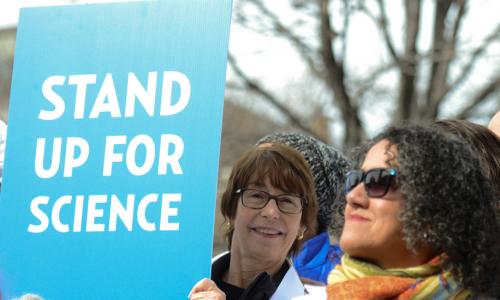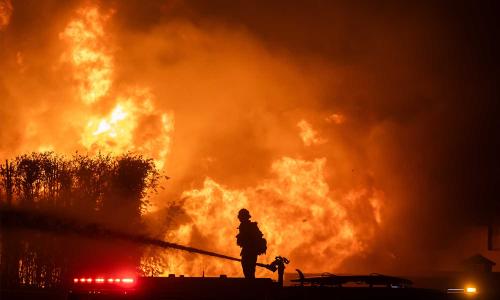Extreme weather takes a toll.
This past summer’s wild weather is just a warmup for the increasingly frequent instances of extreme weather expected to occur with further climate change. Wide-scale flooding in Pakistan; landslides in China; heat, drought, and wildfires in Russia; and record-setting floods and heat waves in the U.S. have left behind death, destruction, and displacement.
These catastrophes cause great physical harm, but they also impose a less obvious toll on the human psyche. When a wildfire destroys your home or business, when a flood washes away your crops for the season or your entire neighborhood, when severe drought stresses your family’s daily life, the psychological effects can be devastating. People coping with severe weather conditions can experience serious mental health symptoms, including posttraumatic stress, depression, and anxiety.
“An intensely traumatic event will have a substantial effect on the mental health of many survivors,” said psychologist and researcher Carl F. Weems, an associate professor at the University of New Orleans. “The more severe and intense your exposure to traumatic experiences during a disaster, the more likely that you will have severe mental health symptoms. If you watch someone die or your house floods, you tend to have more intense effects.”
A weather-related disaster is likely to be an acutely traumatic event. And the closer you are to the center of tragedy, the worse the effects on your mental health, Weems explained. The timing and distance of evacuation, the extent of destruction to your home and community, and the amount of family and community support all play a role. According to Weems, research suggests that between 25 and 50 percent of all people exposed to an extreme weather disaster may have some adverse mental health effects, the degree of severity depending on a number of things, including the person’s age, coping capacity, and proximity to the devastation.
“When you have one of these massive disasters, the effects are long-range,” he said. In the wake of Hurricane Katrina, for example, researchers found no decline in cases of posttraumatic stress disorder symptoms even after more than two years. “Even now we have seen a relatively small drop-off in symptoms. This suggests that we will have to respond to future disasters in new ways, that different kinds of interventions are needed three and four years down the road.” Weems added that the current federal disaster response policy makes little provision for long-term mental health treatment.
Being evacuated from a likely disaster area ahead of time, if that is possible, can help reduce the mental health impacts of severe weather events. Weems put it simply: “The farther you evacuate, the less likely that your mental health will suffer negatively.”
Mental health expert Joy Osofsky, a professor of pediatrics, psychiatry, and public health at Louisiana State University, said that in addition to evacuation, advance planning and preparedness for storms are critical to improving survivors’ mental health outcomes. “People need to have a plan. Pack a backpack with some of your favorite things. Depending on the type of severe weather, you need to plan how to be safe. Where will family members meet? What needs to be there? Food? Water? Flashlights? How are you going to keep your family together? All of this can be articulated in the plan,” she said.
With global temperatures already on the rise, and further warming virtually certain, climate change is having impacts around the globe. Being prepared can help people cope with the severe weather associated with global warming. “We found that for children and families who have prepared, the anxiety is less. I think we have to anticipate there will be unusual events. This kind of preparedness is important to reducing the stress,” Osofsky said.
References
Kessler, R. C., S. Galea, R. T. Jones, and H. A. Parker. 2006. Hurricane Katrina Community Advisory Group. Mental illness and suicidality after Hurricane Katrina. Bulletin of the World Health Organization 84: 930–939.
Masten, A. S., and J. D. Osofsky. 2010. Disasters and their impact on child development: introduction to the special section. Child Development 81 (4): 1029–1039. Online July 15, 2010.
Osofsky, J. D., H. J. Osofsky, and W. W. Harris. 2007. Katrina’s children: social policy considerations for children in disasters. Social Policy Report 21(1) : 3–20.
Weems, C. F., A. A. Pina, N. M. Costa, S. E. Watts, L. K. Taylor, and M. F. Cannon. 2007. Predisaster trait anxiety and negative affect predict posttraumatic stress in youths after hurricane Katrina. Journal of Consulting and Clinical Psychology 75(1):154–159.
Weems, C. F., S. E. Watts, M. A. Marsee, L. K. Taylor, N. M. Costa, M. F. Cannon, V. G. Carrion, and A. A. Pina. 2007. The psychosocial impact of Hurricane Katrina: contextual differences in psychological symptoms, social support, and discrimination. Behaviour Research and Therapy 45(10):2295–2306. Online; May 10, 2007.
See also: PSYR.org's page on climate change and mental health



